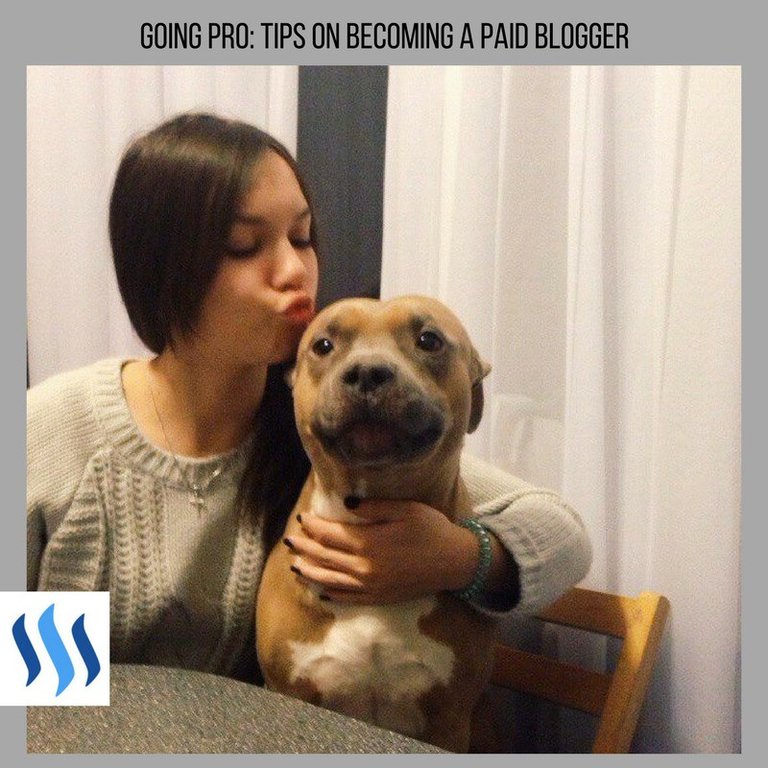
“What tips would you offer to a new blogger who wants to go “Pro” and make money with their blog?”
It looks really easy – this business of being a professional blogger, doesn’t it? In the beginning, it looks like a freelancer’s dream: build a blog, write short articles every day or so, pop a few Adsense ads in, create an Amazon store, and you’ll be rolling in the dough. This article will address the nuances of becoming a professional (read: paid) blogger, and touch on the knowledge base you’ll need to develop in order to get started.
Thoughts on the requirements for making the jump to being a full-time blogger
The Plain Truth
Becoming a paid blogger – a true professional blogger who pays the rent and utility bills by posting content – is a lot of work. The blood, sweat and tears that go into developing a blog that has a strong readership, active membership community, and generated consistant income are not to be overlooked. Here’s a fact: most blogs that are created by professionals (and by professionals I mean someone with the Web dev and digital marketing know-how) will take 6 months to a year before they begin to generate steady earnings. If you’re a newbie, and relatively unknown in the niche you’re starting your blog in, count on it taking even longer.
Paid bloggers make their money in a variety of ways after their blogs are up and running. From advertising revenue to affiliate earnings, there are a multitude of ways to monetize your blog. However, bottom line is that until your blog is seeing a good deal of traffic, has achieved a Page Rank (PR) of at least 3 (PR3), and has a low Alexa rank, you’re not going to see a lot in the way of income.

Why do my own blogs make money? I came from a corporate eMedia background from my previous career at a large publishing company. Being immersed in Web 2.0-speak everyday bumped me ahead — but I still had to learn… a LOT. I taught myself HTML code, graphic design, and how to develop my websites. Keep in mind: many professional bloggers work as freelancers, earning money from the articles they write, and eventually they develop a good reputation and following, which serves to grow their blogs.
Time Commitment
While blogging is a flexible job that you can do full time or part time, the more you put into growing your blog, the greater the profits. Aside from the development of the blog’s theme, you (or someone you pay) will need to write original content, optimized for the search engines. The minimum number of blog posts I recommend is four per week: the most successful bloggers I know are posting fresh content every day. If you’re not one who enjoys writing, struggles with grammar, ordoesn’t have a lot of time to produce articles that people will want to read, then you’ll definitely want to pay someone to create the content for you. Blog posts of around 500 words, written in American English by native english speaking freelancers run $10 to $25 per article.
Learning Curve
Here’s a checklist for newcomers to the blogging world – consider how much you already know about the learning curve here — and how much you will have to teach yourself (or pay to have done) in order to create a top ranked blog that makes money.
PageRank – every blog starts with a page rank of 0. The higher your PR is one of hundreds of triggers Google includes in their algorithms, the more opportunity you’ll have to turn a profit. According to wikipedia, PageRank is a link analysis algorithm, used by the Google Internet search engine. The algorithm assigns a numerical “weight” to each element of a hyperlinked set of documents, to ”measure” its relative importance within the set. Search ‘page rank’ and you’ll get a wealth of information – as well as opinions as to whether PR carries any weight, or not. It does – and knowing how to produce Google-friendly content will most assuredly propel your blog forward.
Alexa rank – blog sites are ranked by readers who have installed the Alexa toolbar, tracking their traffic to your site when they come to read your interesting SEO-based articles. A low number means your blog is highly ranked. Click here to read more about Alexa.
HTML & Coding – the search engines love fresh content that contains links and appropriate headings and subheadings. You will want at least a cursory knowledge of HTML in order to edit the body of your content, as well as for knowing how to insert ads, links, and affiliate codes.
Blog themes and tweaks – you’ll want to install a decent WordPress theme, and know how to use plug-ins, widgets to further customize your blog.
SEO – you need to understand the basics of search engine optimization, and consistently write content around SEO keywords in order to show up in Google, Bing, and Yahoo! search results – and to improve your site’s rank.
Graphics – you may need to learn how to create your own graphics If you want anything aside from a plain-Jane blog. Photoshop, Adobe Illustrator, and others are top of the line, but even with Paint or Powerpoint you can create clean, simple graphics for your site.
Social Media – you’ll need to set up social media accounts (minimally Facebook, Twitter, and Pinterest) to share your content and gain readers. An understanding of the power of social networking is a must when it comes to web site promotion, traffic, and readership.
Driving Traffic to Your Blog
Once your blog is up and running, you will want people to become regular readers. One easy way to get people interested in your web site is to spend some time each day on other blogs in your niche, and leave comments. Before you start commenting, you’ll want to set up a profile on Gravatar, and install the Comment Luv plugin on your blog. That way when you leave a comment on someone’s article, it will include a link back to your site. Leave interesting comments and you’ll find others flocking to see what you’re talking about on your own blog. Another great way to accomplish this is to offer to guest post on other people’s blogs.

New to Blogging since Steemit! There is lot's to learn
Yes, it is hard work but everything is possible, thank you for attention to my post)
Great tips @kristinaljfom, Can you create a steemit version of this? Tips for using steemit as a blogging platform, instead of a personal website? That would be really helpful.
I am fresh at writing blog but after your article I have gained some knowladge about it :) Thank you, followed :)
I am happy if my post is helpful, thank you for your comment)
i agree with you.
I like your post !! It s really usefull.I would really love to leave my actual job and live about blogging 😀
This post is very useful, I found a lot of helpful information.
And I realized there's so much more to learn! :D
Thank you for your comment, it inspires me to continue posting)
Thanks from a fellow who spent 25+ years writing reports for greedy corporations and unethical government agencies but who now wants to do something good for his fellow man.
I would rather be poor than a pawn.